Corporate Social Responsibility: Education and Whistleblowing
VerifiedAdded on 2022/12/30
|12
|4079
|1
Essay
AI Summary
This essay delves into the critical aspects of corporate social responsibility (CSR) and its intricate relationship with the education system. It begins by examining the failures within the educational framework, highlighting how these shortcomings contribute to ethical lapses and corporate scandals. The essay then transitions to a critical evaluation of whistleblowing, analyzing its significance and implications within the business environment. The discussion encompasses the phenomenon of whistleblowing, exploring its characteristics and the ethical considerations surrounding it. The essay further explores how socially responsible businesses should regard whistleblowers. The essay uses a structured approach, dividing the content into distinct parts to examine these interconnected themes, providing a comprehensive overview of the social responsibilities of businesses and the factors that influence ethical behavior in the corporate world. It concludes with a reflection on business social responsibilities.
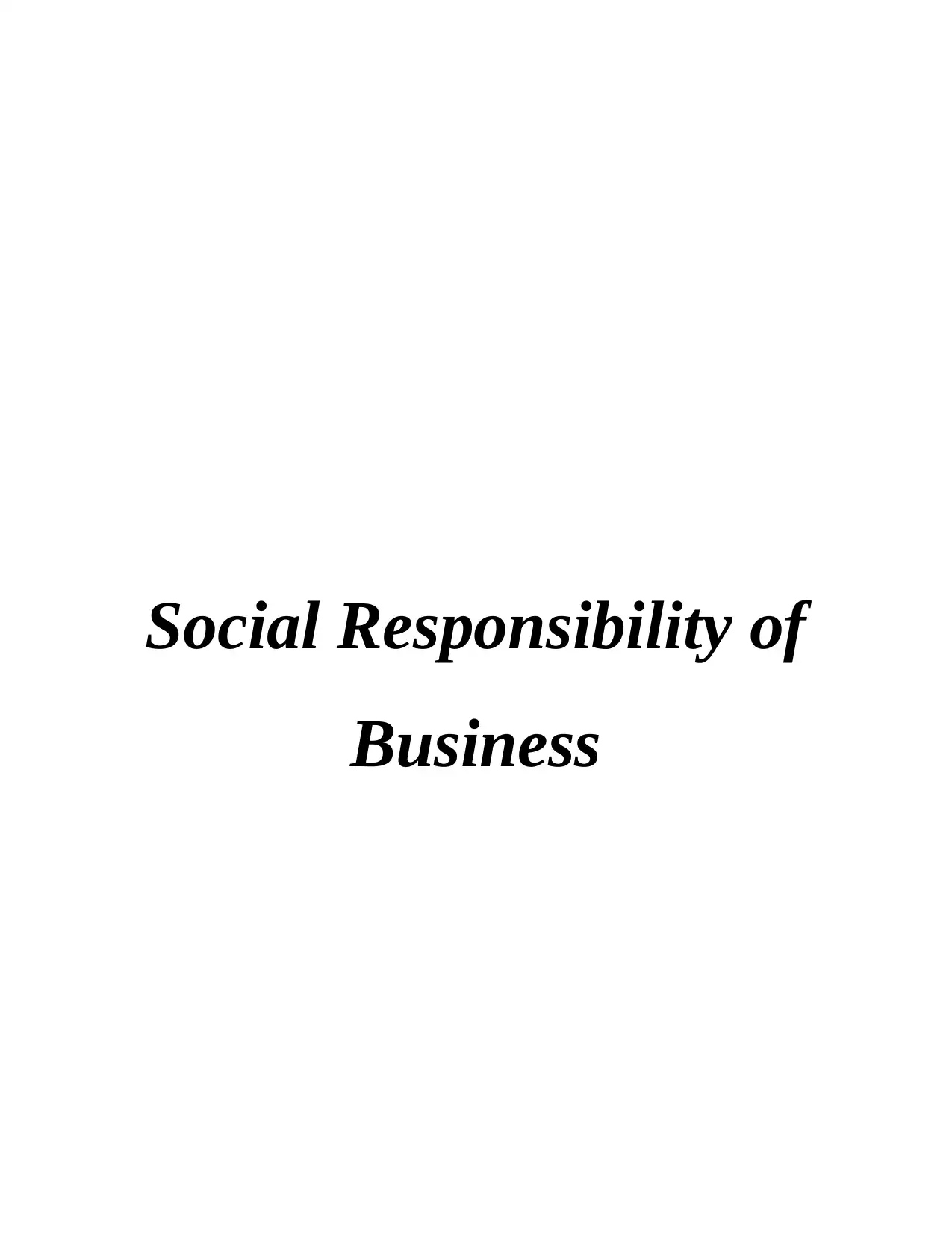
Social Responsibility of
Business
Business
Paraphrase This Document
Need a fresh take? Get an instant paraphrase of this document with our AI Paraphraser
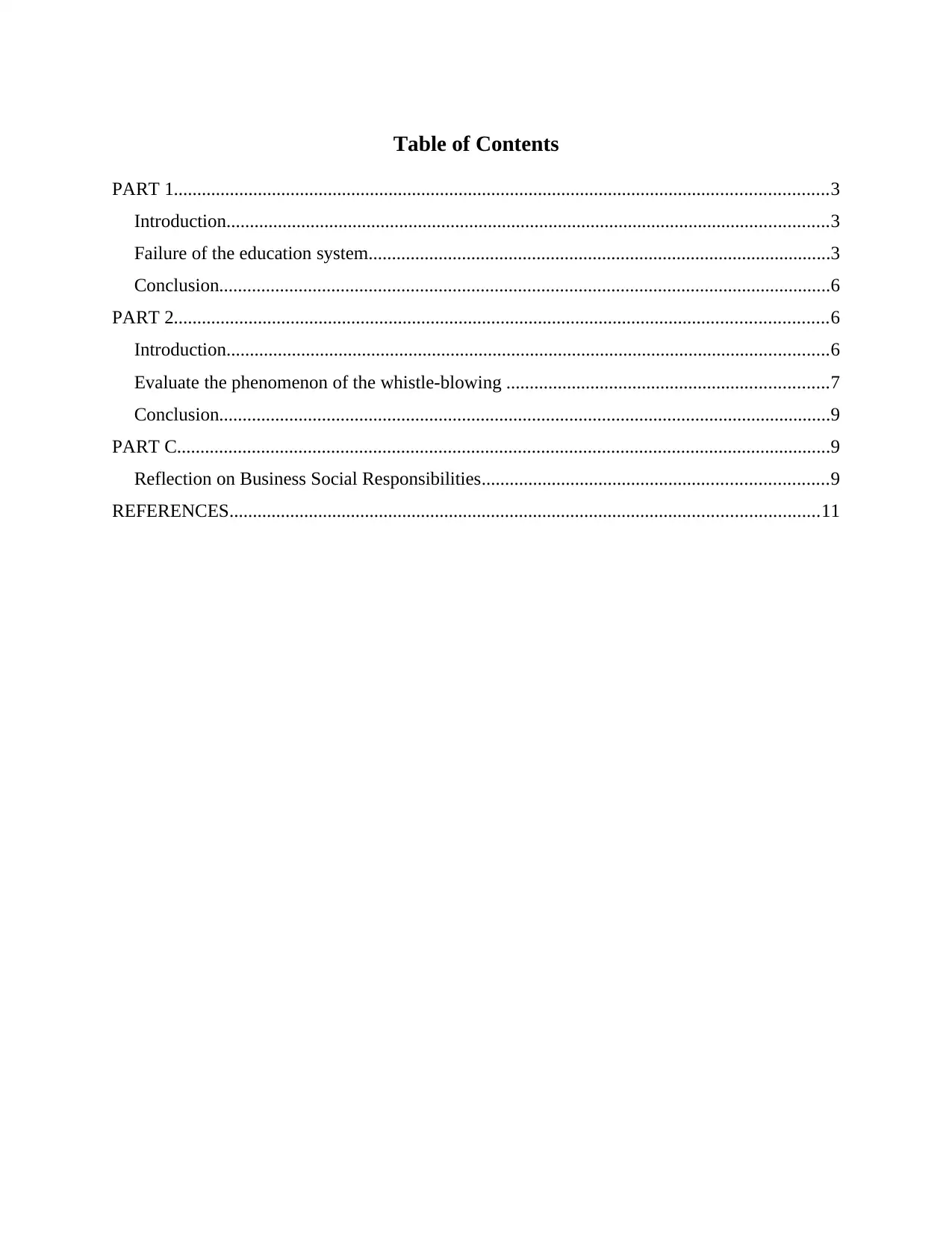
Table of Contents
PART 1............................................................................................................................................3
Introduction.................................................................................................................................3
Failure of the education system...................................................................................................3
Conclusion...................................................................................................................................6
PART 2............................................................................................................................................6
Introduction.................................................................................................................................6
Evaluate the phenomenon of the whistle-blowing .....................................................................7
Conclusion...................................................................................................................................9
PART C............................................................................................................................................9
Reflection on Business Social Responsibilities..........................................................................9
REFERENCES..............................................................................................................................11
PART 1............................................................................................................................................3
Introduction.................................................................................................................................3
Failure of the education system...................................................................................................3
Conclusion...................................................................................................................................6
PART 2............................................................................................................................................6
Introduction.................................................................................................................................6
Evaluate the phenomenon of the whistle-blowing .....................................................................7
Conclusion...................................................................................................................................9
PART C............................................................................................................................................9
Reflection on Business Social Responsibilities..........................................................................9
REFERENCES..............................................................................................................................11
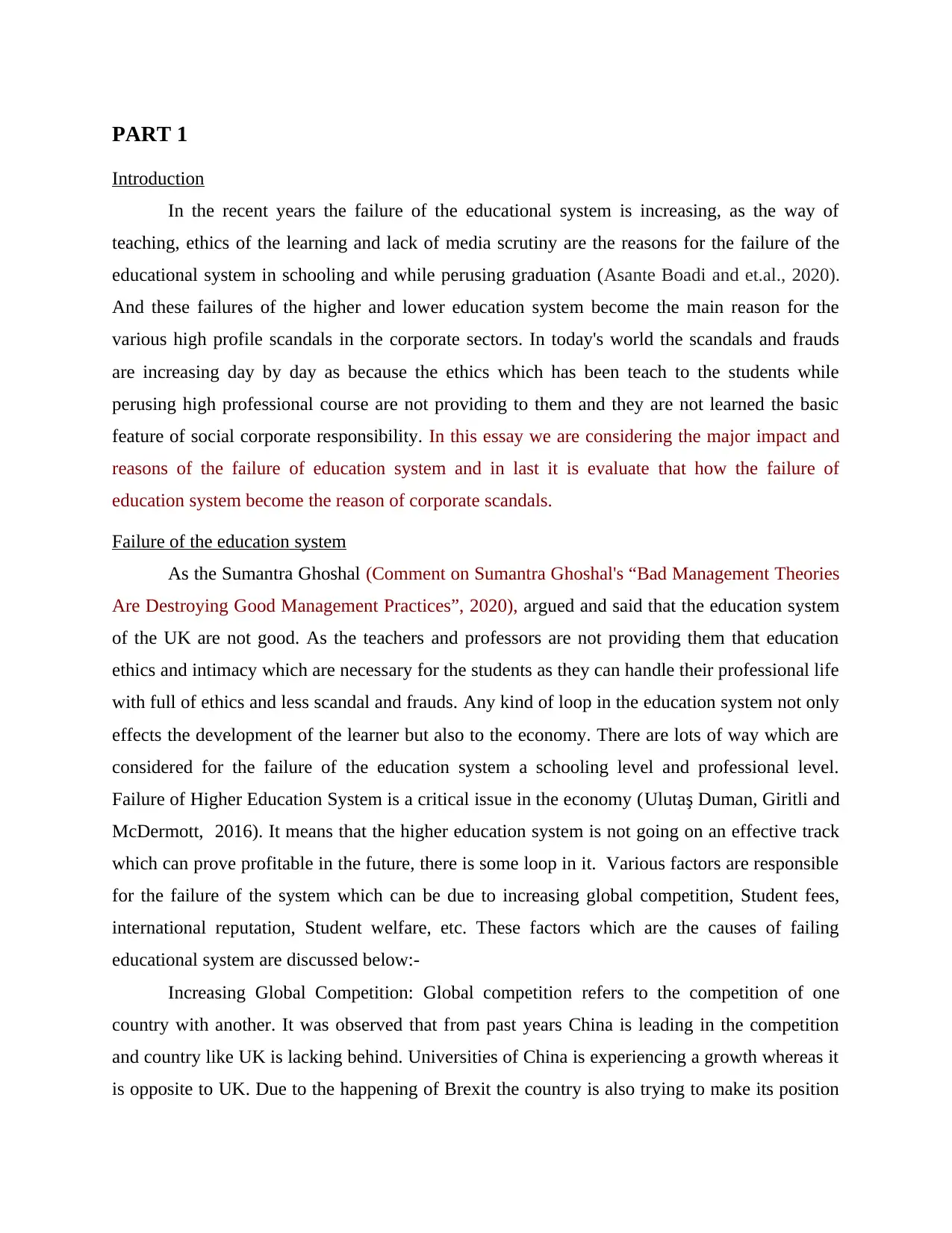
PART 1
Introduction
In the recent years the failure of the educational system is increasing, as the way of
teaching, ethics of the learning and lack of media scrutiny are the reasons for the failure of the
educational system in schooling and while perusing graduation (Asante Boadi and et.al., 2020).
And these failures of the higher and lower education system become the main reason for the
various high profile scandals in the corporate sectors. In today's world the scandals and frauds
are increasing day by day as because the ethics which has been teach to the students while
perusing high professional course are not providing to them and they are not learned the basic
feature of social corporate responsibility. In this essay we are considering the major impact and
reasons of the failure of education system and in last it is evaluate that how the failure of
education system become the reason of corporate scandals.
Failure of the education system
As the Sumantra Ghoshal (Comment on Sumantra Ghoshal's “Bad Management Theories
Are Destroying Good Management Practices”, 2020), argued and said that the education system
of the UK are not good. As the teachers and professors are not providing them that education
ethics and intimacy which are necessary for the students as they can handle their professional life
with full of ethics and less scandal and frauds. Any kind of loop in the education system not only
effects the development of the learner but also to the economy. There are lots of way which are
considered for the failure of the education system a schooling level and professional level.
Failure of Higher Education System is a critical issue in the economy (Ulutaş Duman, Giritli and
McDermott, 2016). It means that the higher education system is not going on an effective track
which can prove profitable in the future, there is some loop in it. Various factors are responsible
for the failure of the system which can be due to increasing global competition, Student fees,
international reputation, Student welfare, etc. These factors which are the causes of failing
educational system are discussed below:-
Increasing Global Competition: Global competition refers to the competition of one
country with another. It was observed that from past years China is leading in the competition
and country like UK is lacking behind. Universities of China is experiencing a growth whereas it
is opposite to UK. Due to the happening of Brexit the country is also trying to make its position
Introduction
In the recent years the failure of the educational system is increasing, as the way of
teaching, ethics of the learning and lack of media scrutiny are the reasons for the failure of the
educational system in schooling and while perusing graduation (Asante Boadi and et.al., 2020).
And these failures of the higher and lower education system become the main reason for the
various high profile scandals in the corporate sectors. In today's world the scandals and frauds
are increasing day by day as because the ethics which has been teach to the students while
perusing high professional course are not providing to them and they are not learned the basic
feature of social corporate responsibility. In this essay we are considering the major impact and
reasons of the failure of education system and in last it is evaluate that how the failure of
education system become the reason of corporate scandals.
Failure of the education system
As the Sumantra Ghoshal (Comment on Sumantra Ghoshal's “Bad Management Theories
Are Destroying Good Management Practices”, 2020), argued and said that the education system
of the UK are not good. As the teachers and professors are not providing them that education
ethics and intimacy which are necessary for the students as they can handle their professional life
with full of ethics and less scandal and frauds. Any kind of loop in the education system not only
effects the development of the learner but also to the economy. There are lots of way which are
considered for the failure of the education system a schooling level and professional level.
Failure of Higher Education System is a critical issue in the economy (Ulutaş Duman, Giritli and
McDermott, 2016). It means that the higher education system is not going on an effective track
which can prove profitable in the future, there is some loop in it. Various factors are responsible
for the failure of the system which can be due to increasing global competition, Student fees,
international reputation, Student welfare, etc. These factors which are the causes of failing
educational system are discussed below:-
Increasing Global Competition: Global competition refers to the competition of one
country with another. It was observed that from past years China is leading in the competition
and country like UK is lacking behind. Universities of China is experiencing a growth whereas it
is opposite to UK. Due to the happening of Brexit the country is also trying to make its position
⊘ This is a preview!⊘
Do you want full access?
Subscribe today to unlock all pages.

Trusted by 1+ million students worldwide
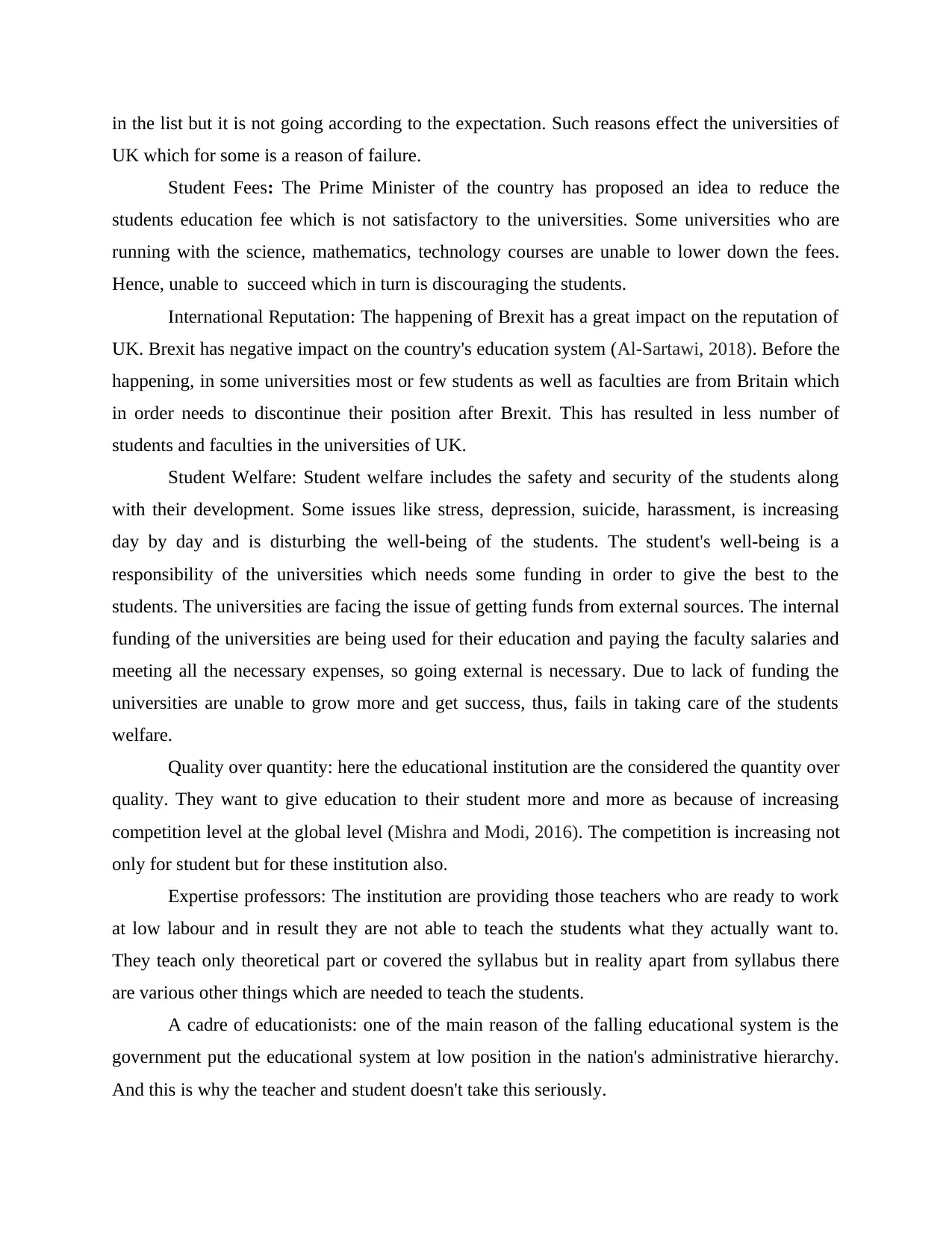
in the list but it is not going according to the expectation. Such reasons effect the universities of
UK which for some is a reason of failure.
Student Fees: The Prime Minister of the country has proposed an idea to reduce the
students education fee which is not satisfactory to the universities. Some universities who are
running with the science, mathematics, technology courses are unable to lower down the fees.
Hence, unable to succeed which in turn is discouraging the students.
International Reputation: The happening of Brexit has a great impact on the reputation of
UK. Brexit has negative impact on the country's education system (Al-Sartawi, 2018). Before the
happening, in some universities most or few students as well as faculties are from Britain which
in order needs to discontinue their position after Brexit. This has resulted in less number of
students and faculties in the universities of UK.
Student Welfare: Student welfare includes the safety and security of the students along
with their development. Some issues like stress, depression, suicide, harassment, is increasing
day by day and is disturbing the well-being of the students. The student's well-being is a
responsibility of the universities which needs some funding in order to give the best to the
students. The universities are facing the issue of getting funds from external sources. The internal
funding of the universities are being used for their education and paying the faculty salaries and
meeting all the necessary expenses, so going external is necessary. Due to lack of funding the
universities are unable to grow more and get success, thus, fails in taking care of the students
welfare.
Quality over quantity: here the educational institution are the considered the quantity over
quality. They want to give education to their student more and more as because of increasing
competition level at the global level (Mishra and Modi, 2016). The competition is increasing not
only for student but for these institution also.
Expertise professors: The institution are providing those teachers who are ready to work
at low labour and in result they are not able to teach the students what they actually want to.
They teach only theoretical part or covered the syllabus but in reality apart from syllabus there
are various other things which are needed to teach the students.
A cadre of educationists: one of the main reason of the falling educational system is the
government put the educational system at low position in the nation's administrative hierarchy.
And this is why the teacher and student doesn't take this seriously.
UK which for some is a reason of failure.
Student Fees: The Prime Minister of the country has proposed an idea to reduce the
students education fee which is not satisfactory to the universities. Some universities who are
running with the science, mathematics, technology courses are unable to lower down the fees.
Hence, unable to succeed which in turn is discouraging the students.
International Reputation: The happening of Brexit has a great impact on the reputation of
UK. Brexit has negative impact on the country's education system (Al-Sartawi, 2018). Before the
happening, in some universities most or few students as well as faculties are from Britain which
in order needs to discontinue their position after Brexit. This has resulted in less number of
students and faculties in the universities of UK.
Student Welfare: Student welfare includes the safety and security of the students along
with their development. Some issues like stress, depression, suicide, harassment, is increasing
day by day and is disturbing the well-being of the students. The student's well-being is a
responsibility of the universities which needs some funding in order to give the best to the
students. The universities are facing the issue of getting funds from external sources. The internal
funding of the universities are being used for their education and paying the faculty salaries and
meeting all the necessary expenses, so going external is necessary. Due to lack of funding the
universities are unable to grow more and get success, thus, fails in taking care of the students
welfare.
Quality over quantity: here the educational institution are the considered the quantity over
quality. They want to give education to their student more and more as because of increasing
competition level at the global level (Mishra and Modi, 2016). The competition is increasing not
only for student but for these institution also.
Expertise professors: The institution are providing those teachers who are ready to work
at low labour and in result they are not able to teach the students what they actually want to.
They teach only theoretical part or covered the syllabus but in reality apart from syllabus there
are various other things which are needed to teach the students.
A cadre of educationists: one of the main reason of the falling educational system is the
government put the educational system at low position in the nation's administrative hierarchy.
And this is why the teacher and student doesn't take this seriously.
Paraphrase This Document
Need a fresh take? Get an instant paraphrase of this document with our AI Paraphraser
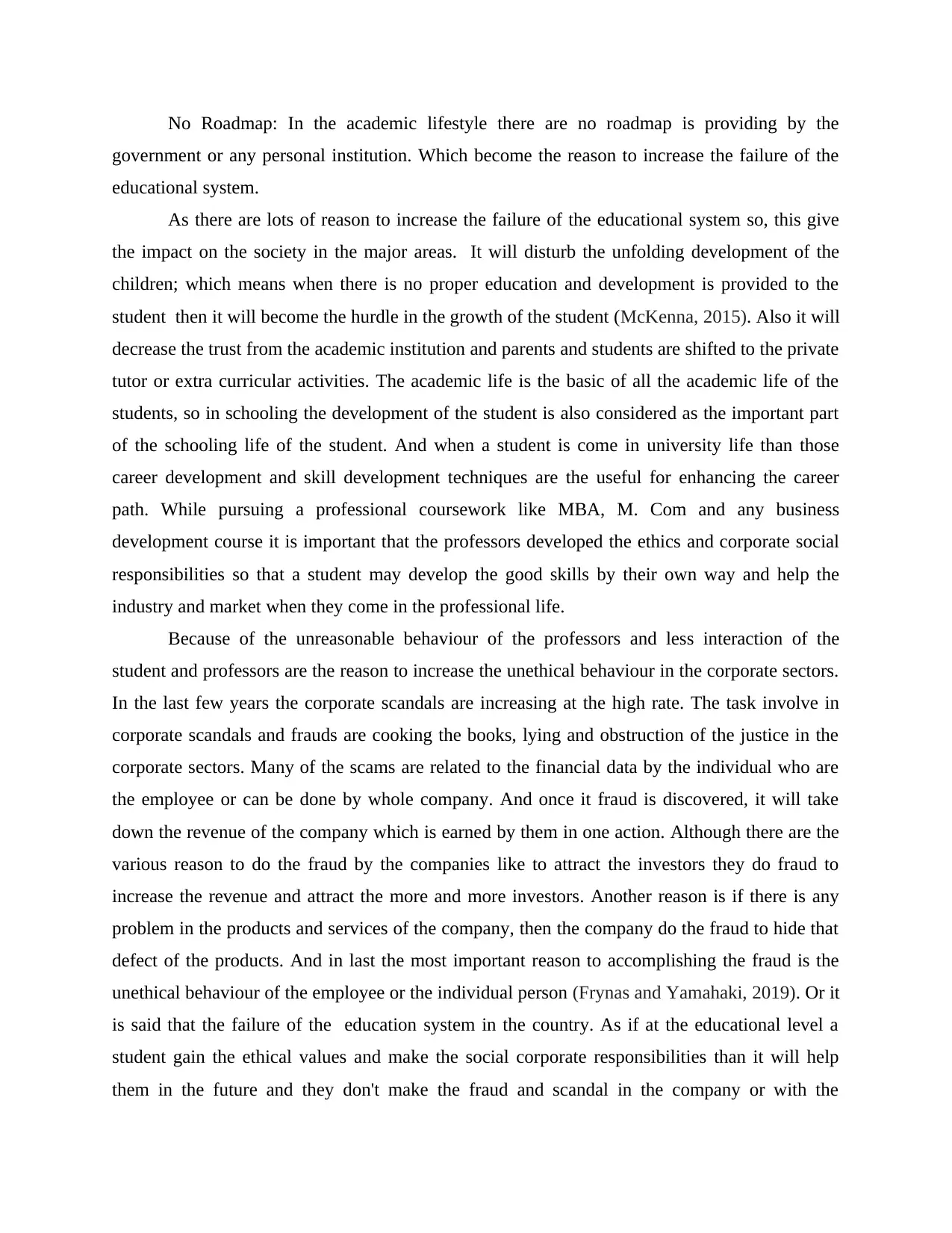
No Roadmap: In the academic lifestyle there are no roadmap is providing by the
government or any personal institution. Which become the reason to increase the failure of the
educational system.
As there are lots of reason to increase the failure of the educational system so, this give
the impact on the society in the major areas. It will disturb the unfolding development of the
children; which means when there is no proper education and development is provided to the
student then it will become the hurdle in the growth of the student (McKenna, 2015). Also it will
decrease the trust from the academic institution and parents and students are shifted to the private
tutor or extra curricular activities. The academic life is the basic of all the academic life of the
students, so in schooling the development of the student is also considered as the important part
of the schooling life of the student. And when a student is come in university life than those
career development and skill development techniques are the useful for enhancing the career
path. While pursuing a professional coursework like MBA, M. Com and any business
development course it is important that the professors developed the ethics and corporate social
responsibilities so that a student may develop the good skills by their own way and help the
industry and market when they come in the professional life.
Because of the unreasonable behaviour of the professors and less interaction of the
student and professors are the reason to increase the unethical behaviour in the corporate sectors.
In the last few years the corporate scandals are increasing at the high rate. The task involve in
corporate scandals and frauds are cooking the books, lying and obstruction of the justice in the
corporate sectors. Many of the scams are related to the financial data by the individual who are
the employee or can be done by whole company. And once it fraud is discovered, it will take
down the revenue of the company which is earned by them in one action. Although there are the
various reason to do the fraud by the companies like to attract the investors they do fraud to
increase the revenue and attract the more and more investors. Another reason is if there is any
problem in the products and services of the company, then the company do the fraud to hide that
defect of the products. And in last the most important reason to accomplishing the fraud is the
unethical behaviour of the employee or the individual person (Frynas and Yamahaki, 2019). Or it
is said that the failure of the education system in the country. As if at the educational level a
student gain the ethical values and make the social corporate responsibilities than it will help
them in the future and they don't make the fraud and scandal in the company or with the
government or any personal institution. Which become the reason to increase the failure of the
educational system.
As there are lots of reason to increase the failure of the educational system so, this give
the impact on the society in the major areas. It will disturb the unfolding development of the
children; which means when there is no proper education and development is provided to the
student then it will become the hurdle in the growth of the student (McKenna, 2015). Also it will
decrease the trust from the academic institution and parents and students are shifted to the private
tutor or extra curricular activities. The academic life is the basic of all the academic life of the
students, so in schooling the development of the student is also considered as the important part
of the schooling life of the student. And when a student is come in university life than those
career development and skill development techniques are the useful for enhancing the career
path. While pursuing a professional coursework like MBA, M. Com and any business
development course it is important that the professors developed the ethics and corporate social
responsibilities so that a student may develop the good skills by their own way and help the
industry and market when they come in the professional life.
Because of the unreasonable behaviour of the professors and less interaction of the
student and professors are the reason to increase the unethical behaviour in the corporate sectors.
In the last few years the corporate scandals are increasing at the high rate. The task involve in
corporate scandals and frauds are cooking the books, lying and obstruction of the justice in the
corporate sectors. Many of the scams are related to the financial data by the individual who are
the employee or can be done by whole company. And once it fraud is discovered, it will take
down the revenue of the company which is earned by them in one action. Although there are the
various reason to do the fraud by the companies like to attract the investors they do fraud to
increase the revenue and attract the more and more investors. Another reason is if there is any
problem in the products and services of the company, then the company do the fraud to hide that
defect of the products. And in last the most important reason to accomplishing the fraud is the
unethical behaviour of the employee or the individual person (Frynas and Yamahaki, 2019). Or it
is said that the failure of the education system in the country. As if at the educational level a
student gain the ethical values and make the social corporate responsibilities than it will help
them in the future and they don't make the fraud and scandal in the company or with the
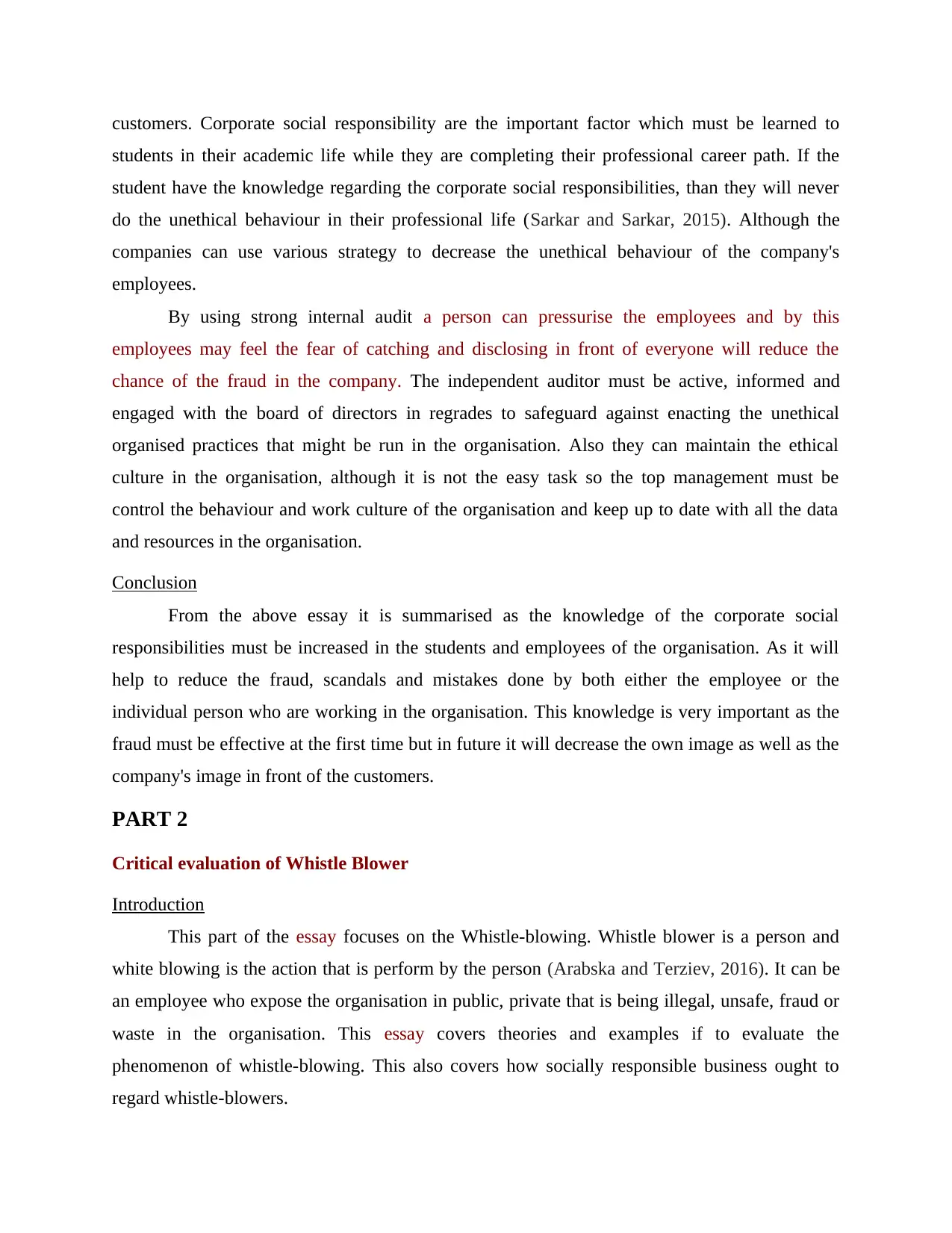
customers. Corporate social responsibility are the important factor which must be learned to
students in their academic life while they are completing their professional career path. If the
student have the knowledge regarding the corporate social responsibilities, than they will never
do the unethical behaviour in their professional life (Sarkar and Sarkar, 2015). Although the
companies can use various strategy to decrease the unethical behaviour of the company's
employees.
By using strong internal audit a person can pressurise the employees and by this
employees may feel the fear of catching and disclosing in front of everyone will reduce the
chance of the fraud in the company. The independent auditor must be active, informed and
engaged with the board of directors in regrades to safeguard against enacting the unethical
organised practices that might be run in the organisation. Also they can maintain the ethical
culture in the organisation, although it is not the easy task so the top management must be
control the behaviour and work culture of the organisation and keep up to date with all the data
and resources in the organisation.
Conclusion
From the above essay it is summarised as the knowledge of the corporate social
responsibilities must be increased in the students and employees of the organisation. As it will
help to reduce the fraud, scandals and mistakes done by both either the employee or the
individual person who are working in the organisation. This knowledge is very important as the
fraud must be effective at the first time but in future it will decrease the own image as well as the
company's image in front of the customers.
PART 2
Critical evaluation of Whistle Blower
Introduction
This part of the essay focuses on the Whistle-blowing. Whistle blower is a person and
white blowing is the action that is perform by the person (Arabska and Terziev, 2016). It can be
an employee who expose the organisation in public, private that is being illegal, unsafe, fraud or
waste in the organisation. This essay covers theories and examples if to evaluate the
phenomenon of whistle-blowing. This also covers how socially responsible business ought to
regard whistle-blowers.
students in their academic life while they are completing their professional career path. If the
student have the knowledge regarding the corporate social responsibilities, than they will never
do the unethical behaviour in their professional life (Sarkar and Sarkar, 2015). Although the
companies can use various strategy to decrease the unethical behaviour of the company's
employees.
By using strong internal audit a person can pressurise the employees and by this
employees may feel the fear of catching and disclosing in front of everyone will reduce the
chance of the fraud in the company. The independent auditor must be active, informed and
engaged with the board of directors in regrades to safeguard against enacting the unethical
organised practices that might be run in the organisation. Also they can maintain the ethical
culture in the organisation, although it is not the easy task so the top management must be
control the behaviour and work culture of the organisation and keep up to date with all the data
and resources in the organisation.
Conclusion
From the above essay it is summarised as the knowledge of the corporate social
responsibilities must be increased in the students and employees of the organisation. As it will
help to reduce the fraud, scandals and mistakes done by both either the employee or the
individual person who are working in the organisation. This knowledge is very important as the
fraud must be effective at the first time but in future it will decrease the own image as well as the
company's image in front of the customers.
PART 2
Critical evaluation of Whistle Blower
Introduction
This part of the essay focuses on the Whistle-blowing. Whistle blower is a person and
white blowing is the action that is perform by the person (Arabska and Terziev, 2016). It can be
an employee who expose the organisation in public, private that is being illegal, unsafe, fraud or
waste in the organisation. This essay covers theories and examples if to evaluate the
phenomenon of whistle-blowing. This also covers how socially responsible business ought to
regard whistle-blowers.
⊘ This is a preview!⊘
Do you want full access?
Subscribe today to unlock all pages.

Trusted by 1+ million students worldwide
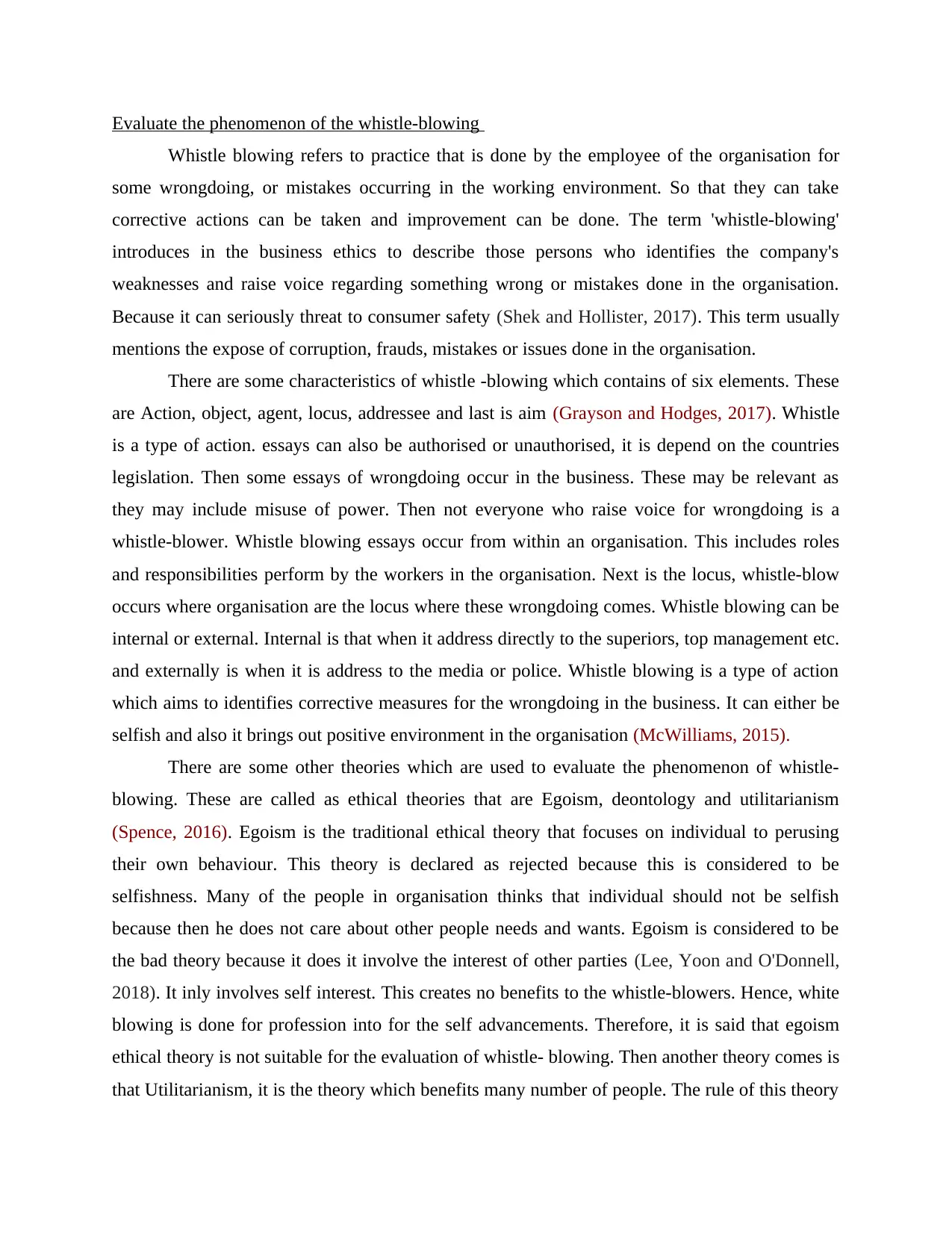
Evaluate the phenomenon of the whistle-blowing
Whistle blowing refers to practice that is done by the employee of the organisation for
some wrongdoing, or mistakes occurring in the working environment. So that they can take
corrective actions can be taken and improvement can be done. The term 'whistle-blowing'
introduces in the business ethics to describe those persons who identifies the company's
weaknesses and raise voice regarding something wrong or mistakes done in the organisation.
Because it can seriously threat to consumer safety (Shek and Hollister, 2017). This term usually
mentions the expose of corruption, frauds, mistakes or issues done in the organisation.
There are some characteristics of whistle -blowing which contains of six elements. These
are Action, object, agent, locus, addressee and last is aim (Grayson and Hodges, 2017). Whistle
is a type of action. essays can also be authorised or unauthorised, it is depend on the countries
legislation. Then some essays of wrongdoing occur in the business. These may be relevant as
they may include misuse of power. Then not everyone who raise voice for wrongdoing is a
whistle-blower. Whistle blowing essays occur from within an organisation. This includes roles
and responsibilities perform by the workers in the organisation. Next is the locus, whistle-blow
occurs where organisation are the locus where these wrongdoing comes. Whistle blowing can be
internal or external. Internal is that when it address directly to the superiors, top management etc.
and externally is when it is address to the media or police. Whistle blowing is a type of action
which aims to identifies corrective measures for the wrongdoing in the business. It can either be
selfish and also it brings out positive environment in the organisation (McWilliams, 2015).
There are some other theories which are used to evaluate the phenomenon of whistle-
blowing. These are called as ethical theories that are Egoism, deontology and utilitarianism
(Spence, 2016). Egoism is the traditional ethical theory that focuses on individual to perusing
their own behaviour. This theory is declared as rejected because this is considered to be
selfishness. Many of the people in organisation thinks that individual should not be selfish
because then he does not care about other people needs and wants. Egoism is considered to be
the bad theory because it does it involve the interest of other parties (Lee, Yoon and O'Donnell,
2018). It inly involves self interest. This creates no benefits to the whistle-blowers. Hence, white
blowing is done for profession into for the self advancements. Therefore, it is said that egoism
ethical theory is not suitable for the evaluation of whistle- blowing. Then another theory comes is
that Utilitarianism, it is the theory which benefits many number of people. The rule of this theory
Whistle blowing refers to practice that is done by the employee of the organisation for
some wrongdoing, or mistakes occurring in the working environment. So that they can take
corrective actions can be taken and improvement can be done. The term 'whistle-blowing'
introduces in the business ethics to describe those persons who identifies the company's
weaknesses and raise voice regarding something wrong or mistakes done in the organisation.
Because it can seriously threat to consumer safety (Shek and Hollister, 2017). This term usually
mentions the expose of corruption, frauds, mistakes or issues done in the organisation.
There are some characteristics of whistle -blowing which contains of six elements. These
are Action, object, agent, locus, addressee and last is aim (Grayson and Hodges, 2017). Whistle
is a type of action. essays can also be authorised or unauthorised, it is depend on the countries
legislation. Then some essays of wrongdoing occur in the business. These may be relevant as
they may include misuse of power. Then not everyone who raise voice for wrongdoing is a
whistle-blower. Whistle blowing essays occur from within an organisation. This includes roles
and responsibilities perform by the workers in the organisation. Next is the locus, whistle-blow
occurs where organisation are the locus where these wrongdoing comes. Whistle blowing can be
internal or external. Internal is that when it address directly to the superiors, top management etc.
and externally is when it is address to the media or police. Whistle blowing is a type of action
which aims to identifies corrective measures for the wrongdoing in the business. It can either be
selfish and also it brings out positive environment in the organisation (McWilliams, 2015).
There are some other theories which are used to evaluate the phenomenon of whistle-
blowing. These are called as ethical theories that are Egoism, deontology and utilitarianism
(Spence, 2016). Egoism is the traditional ethical theory that focuses on individual to perusing
their own behaviour. This theory is declared as rejected because this is considered to be
selfishness. Many of the people in organisation thinks that individual should not be selfish
because then he does not care about other people needs and wants. Egoism is considered to be
the bad theory because it does it involve the interest of other parties (Lee, Yoon and O'Donnell,
2018). It inly involves self interest. This creates no benefits to the whistle-blowers. Hence, white
blowing is done for profession into for the self advancements. Therefore, it is said that egoism
ethical theory is not suitable for the evaluation of whistle- blowing. Then another theory comes is
that Utilitarianism, it is the theory which benefits many number of people. The rule of this theory
Paraphrase This Document
Need a fresh take? Get an instant paraphrase of this document with our AI Paraphraser
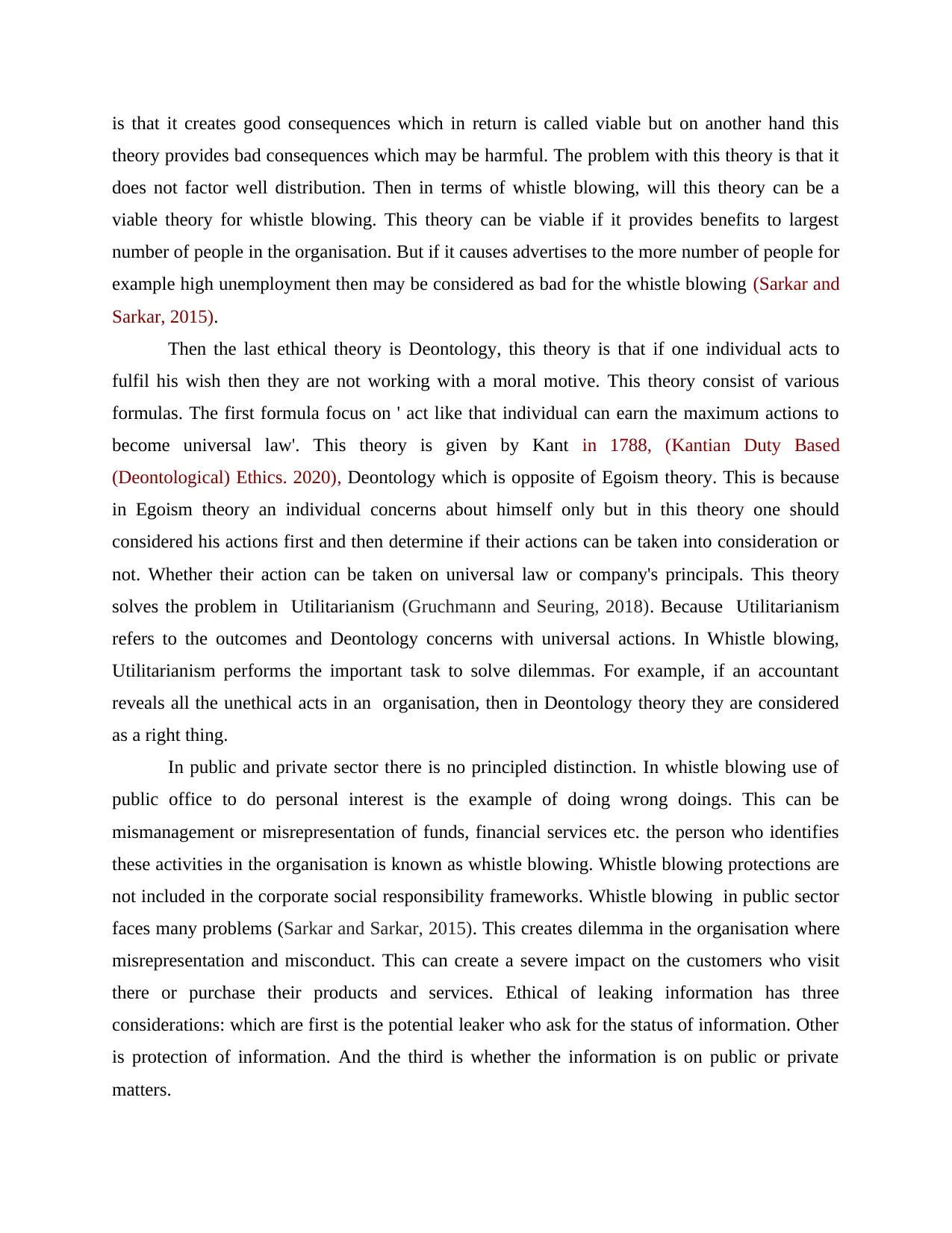
is that it creates good consequences which in return is called viable but on another hand this
theory provides bad consequences which may be harmful. The problem with this theory is that it
does not factor well distribution. Then in terms of whistle blowing, will this theory can be a
viable theory for whistle blowing. This theory can be viable if it provides benefits to largest
number of people in the organisation. But if it causes advertises to the more number of people for
example high unemployment then may be considered as bad for the whistle blowing (Sarkar and
Sarkar, 2015).
Then the last ethical theory is Deontology, this theory is that if one individual acts to
fulfil his wish then they are not working with a moral motive. This theory consist of various
formulas. The first formula focus on ' act like that individual can earn the maximum actions to
become universal law'. This theory is given by Kant in 1788, (Kantian Duty Based
(Deontological) Ethics. 2020), Deontology which is opposite of Egoism theory. This is because
in Egoism theory an individual concerns about himself only but in this theory one should
considered his actions first and then determine if their actions can be taken into consideration or
not. Whether their action can be taken on universal law or company's principals. This theory
solves the problem in Utilitarianism (Gruchmann and Seuring, 2018). Because Utilitarianism
refers to the outcomes and Deontology concerns with universal actions. In Whistle blowing,
Utilitarianism performs the important task to solve dilemmas. For example, if an accountant
reveals all the unethical acts in an organisation, then in Deontology theory they are considered
as a right thing.
In public and private sector there is no principled distinction. In whistle blowing use of
public office to do personal interest is the example of doing wrong doings. This can be
mismanagement or misrepresentation of funds, financial services etc. the person who identifies
these activities in the organisation is known as whistle blowing. Whistle blowing protections are
not included in the corporate social responsibility frameworks. Whistle blowing in public sector
faces many problems (Sarkar and Sarkar, 2015). This creates dilemma in the organisation where
misrepresentation and misconduct. This can create a severe impact on the customers who visit
there or purchase their products and services. Ethical of leaking information has three
considerations: which are first is the potential leaker who ask for the status of information. Other
is protection of information. And the third is whether the information is on public or private
matters.
theory provides bad consequences which may be harmful. The problem with this theory is that it
does not factor well distribution. Then in terms of whistle blowing, will this theory can be a
viable theory for whistle blowing. This theory can be viable if it provides benefits to largest
number of people in the organisation. But if it causes advertises to the more number of people for
example high unemployment then may be considered as bad for the whistle blowing (Sarkar and
Sarkar, 2015).
Then the last ethical theory is Deontology, this theory is that if one individual acts to
fulfil his wish then they are not working with a moral motive. This theory consist of various
formulas. The first formula focus on ' act like that individual can earn the maximum actions to
become universal law'. This theory is given by Kant in 1788, (Kantian Duty Based
(Deontological) Ethics. 2020), Deontology which is opposite of Egoism theory. This is because
in Egoism theory an individual concerns about himself only but in this theory one should
considered his actions first and then determine if their actions can be taken into consideration or
not. Whether their action can be taken on universal law or company's principals. This theory
solves the problem in Utilitarianism (Gruchmann and Seuring, 2018). Because Utilitarianism
refers to the outcomes and Deontology concerns with universal actions. In Whistle blowing,
Utilitarianism performs the important task to solve dilemmas. For example, if an accountant
reveals all the unethical acts in an organisation, then in Deontology theory they are considered
as a right thing.
In public and private sector there is no principled distinction. In whistle blowing use of
public office to do personal interest is the example of doing wrong doings. This can be
mismanagement or misrepresentation of funds, financial services etc. the person who identifies
these activities in the organisation is known as whistle blowing. Whistle blowing protections are
not included in the corporate social responsibility frameworks. Whistle blowing in public sector
faces many problems (Sarkar and Sarkar, 2015). This creates dilemma in the organisation where
misrepresentation and misconduct. This can create a severe impact on the customers who visit
there or purchase their products and services. Ethical of leaking information has three
considerations: which are first is the potential leaker who ask for the status of information. Other
is protection of information. And the third is whether the information is on public or private
matters.
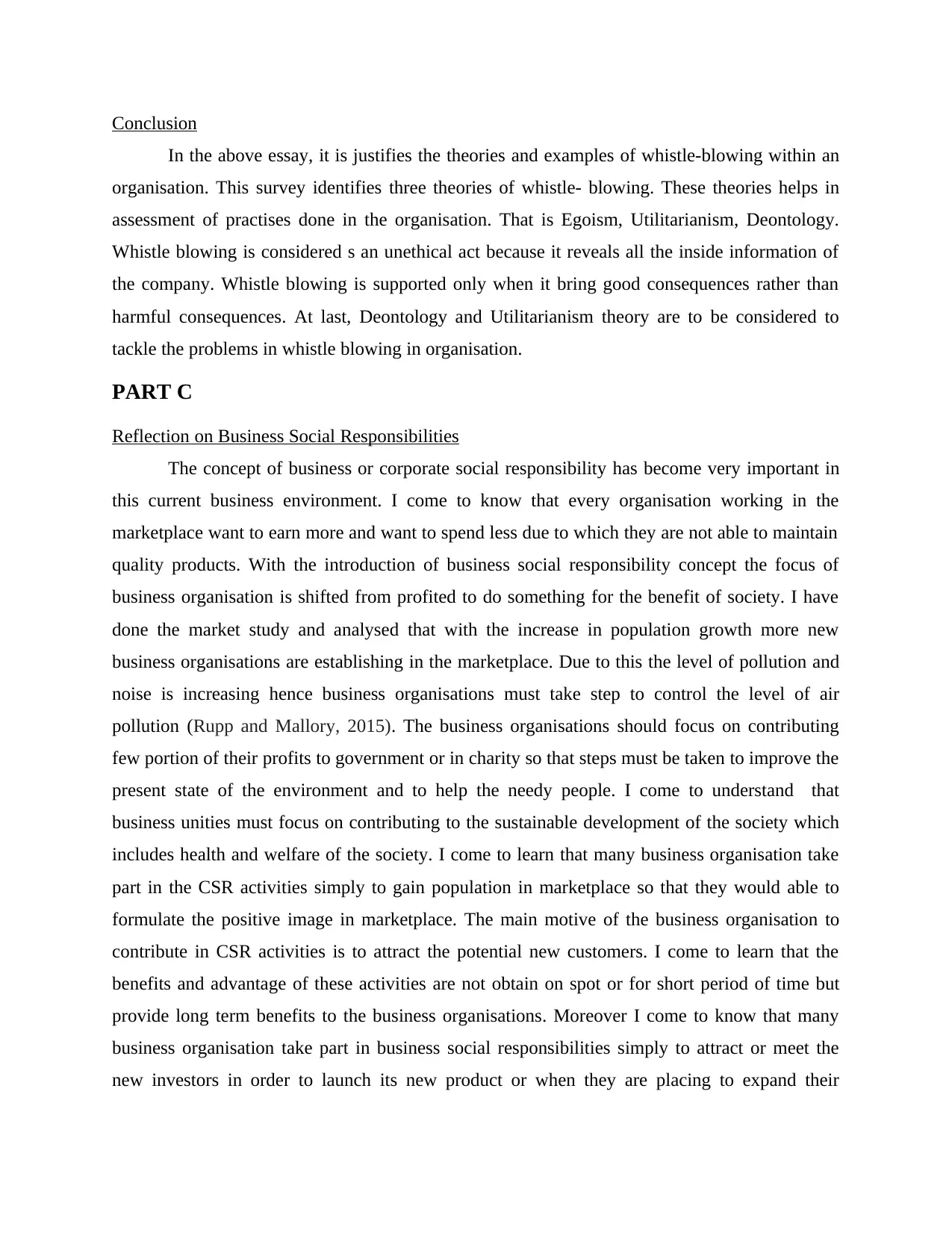
Conclusion
In the above essay, it is justifies the theories and examples of whistle-blowing within an
organisation. This survey identifies three theories of whistle- blowing. These theories helps in
assessment of practises done in the organisation. That is Egoism, Utilitarianism, Deontology.
Whistle blowing is considered s an unethical act because it reveals all the inside information of
the company. Whistle blowing is supported only when it bring good consequences rather than
harmful consequences. At last, Deontology and Utilitarianism theory are to be considered to
tackle the problems in whistle blowing in organisation.
PART C
Reflection on Business Social Responsibilities
The concept of business or corporate social responsibility has become very important in
this current business environment. I come to know that every organisation working in the
marketplace want to earn more and want to spend less due to which they are not able to maintain
quality products. With the introduction of business social responsibility concept the focus of
business organisation is shifted from profited to do something for the benefit of society. I have
done the market study and analysed that with the increase in population growth more new
business organisations are establishing in the marketplace. Due to this the level of pollution and
noise is increasing hence business organisations must take step to control the level of air
pollution (Rupp and Mallory, 2015). The business organisations should focus on contributing
few portion of their profits to government or in charity so that steps must be taken to improve the
present state of the environment and to help the needy people. I come to understand that
business unities must focus on contributing to the sustainable development of the society which
includes health and welfare of the society. I come to learn that many business organisation take
part in the CSR activities simply to gain population in marketplace so that they would able to
formulate the positive image in marketplace. The main motive of the business organisation to
contribute in CSR activities is to attract the potential new customers. I come to learn that the
benefits and advantage of these activities are not obtain on spot or for short period of time but
provide long term benefits to the business organisations. Moreover I come to know that many
business organisation take part in business social responsibilities simply to attract or meet the
new investors in order to launch its new product or when they are placing to expand their
In the above essay, it is justifies the theories and examples of whistle-blowing within an
organisation. This survey identifies three theories of whistle- blowing. These theories helps in
assessment of practises done in the organisation. That is Egoism, Utilitarianism, Deontology.
Whistle blowing is considered s an unethical act because it reveals all the inside information of
the company. Whistle blowing is supported only when it bring good consequences rather than
harmful consequences. At last, Deontology and Utilitarianism theory are to be considered to
tackle the problems in whistle blowing in organisation.
PART C
Reflection on Business Social Responsibilities
The concept of business or corporate social responsibility has become very important in
this current business environment. I come to know that every organisation working in the
marketplace want to earn more and want to spend less due to which they are not able to maintain
quality products. With the introduction of business social responsibility concept the focus of
business organisation is shifted from profited to do something for the benefit of society. I have
done the market study and analysed that with the increase in population growth more new
business organisations are establishing in the marketplace. Due to this the level of pollution and
noise is increasing hence business organisations must take step to control the level of air
pollution (Rupp and Mallory, 2015). The business organisations should focus on contributing
few portion of their profits to government or in charity so that steps must be taken to improve the
present state of the environment and to help the needy people. I come to understand that
business unities must focus on contributing to the sustainable development of the society which
includes health and welfare of the society. I come to learn that many business organisation take
part in the CSR activities simply to gain population in marketplace so that they would able to
formulate the positive image in marketplace. The main motive of the business organisation to
contribute in CSR activities is to attract the potential new customers. I come to learn that the
benefits and advantage of these activities are not obtain on spot or for short period of time but
provide long term benefits to the business organisations. Moreover I come to know that many
business organisation take part in business social responsibilities simply to attract or meet the
new investors in order to launch its new product or when they are placing to expand their
⊘ This is a preview!⊘
Do you want full access?
Subscribe today to unlock all pages.

Trusted by 1+ million students worldwide
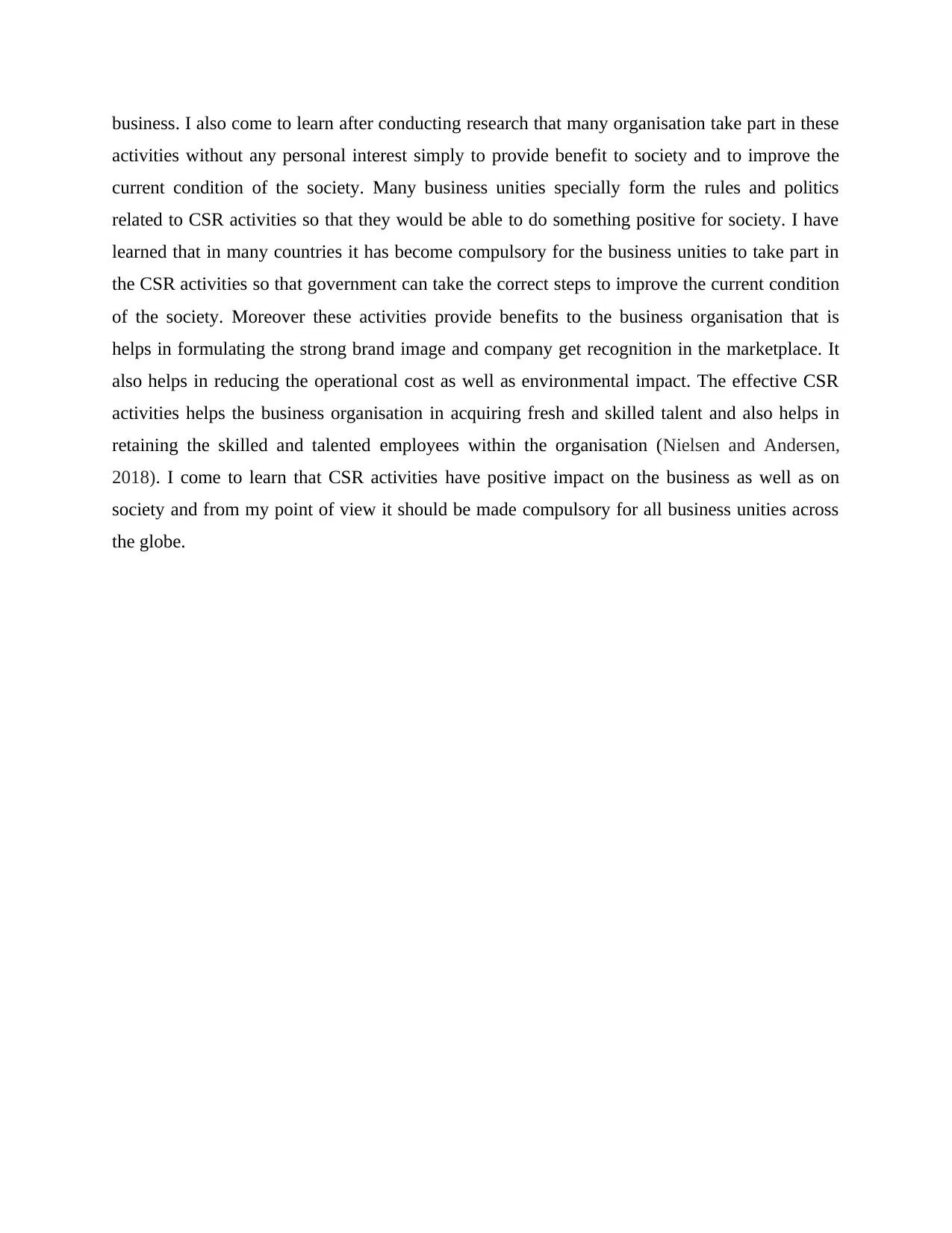
business. I also come to learn after conducting research that many organisation take part in these
activities without any personal interest simply to provide benefit to society and to improve the
current condition of the society. Many business unities specially form the rules and politics
related to CSR activities so that they would be able to do something positive for society. I have
learned that in many countries it has become compulsory for the business unities to take part in
the CSR activities so that government can take the correct steps to improve the current condition
of the society. Moreover these activities provide benefits to the business organisation that is
helps in formulating the strong brand image and company get recognition in the marketplace. It
also helps in reducing the operational cost as well as environmental impact. The effective CSR
activities helps the business organisation in acquiring fresh and skilled talent and also helps in
retaining the skilled and talented employees within the organisation (Nielsen and Andersen,
2018). I come to learn that CSR activities have positive impact on the business as well as on
society and from my point of view it should be made compulsory for all business unities across
the globe.
activities without any personal interest simply to provide benefit to society and to improve the
current condition of the society. Many business unities specially form the rules and politics
related to CSR activities so that they would be able to do something positive for society. I have
learned that in many countries it has become compulsory for the business unities to take part in
the CSR activities so that government can take the correct steps to improve the current condition
of the society. Moreover these activities provide benefits to the business organisation that is
helps in formulating the strong brand image and company get recognition in the marketplace. It
also helps in reducing the operational cost as well as environmental impact. The effective CSR
activities helps the business organisation in acquiring fresh and skilled talent and also helps in
retaining the skilled and talented employees within the organisation (Nielsen and Andersen,
2018). I come to learn that CSR activities have positive impact on the business as well as on
society and from my point of view it should be made compulsory for all business unities across
the globe.
Paraphrase This Document
Need a fresh take? Get an instant paraphrase of this document with our AI Paraphraser
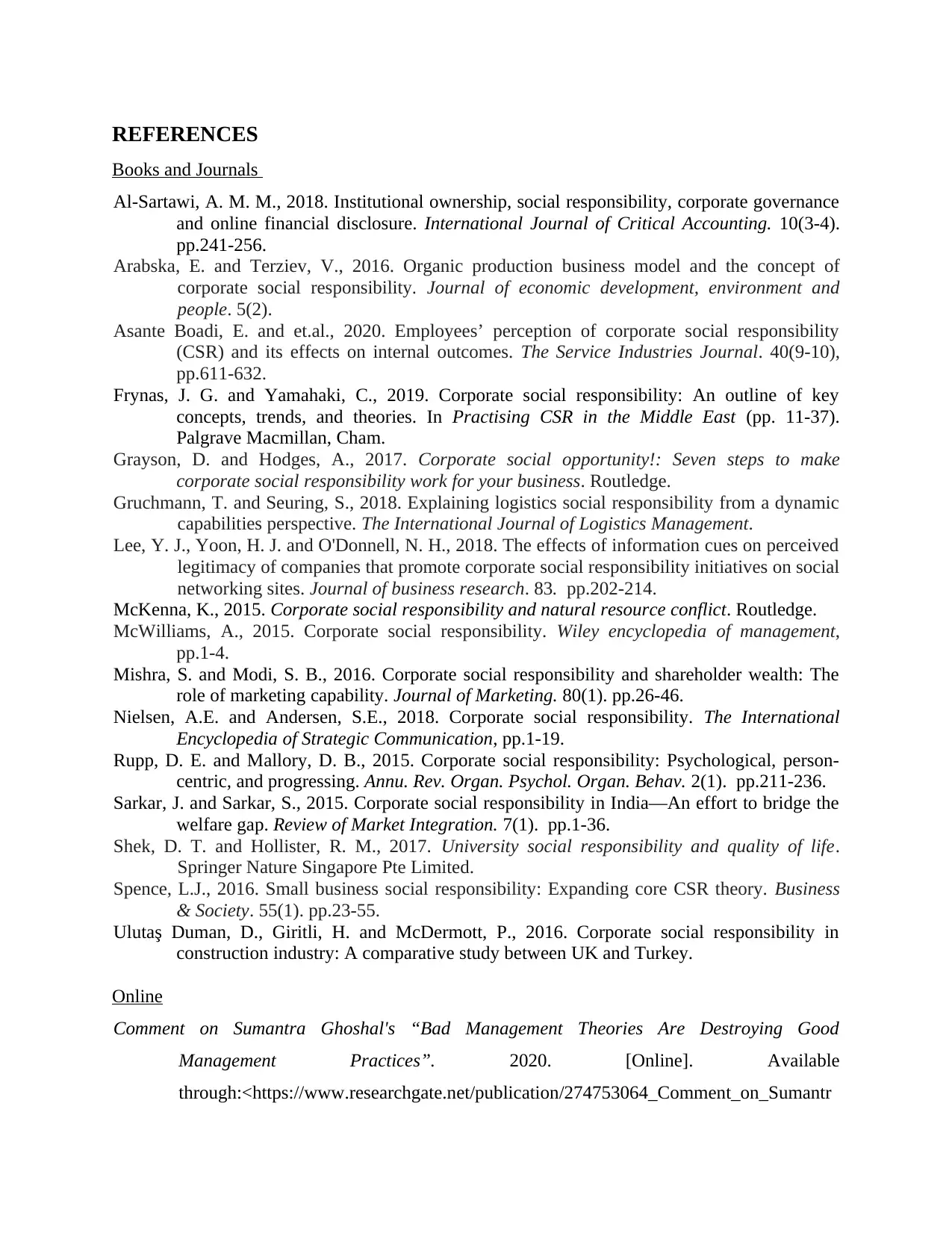
REFERENCES
Books and Journals
Al-Sartawi, A. M. M., 2018. Institutional ownership, social responsibility, corporate governance
and online financial disclosure. International Journal of Critical Accounting. 10(3-4).
pp.241-256.
Arabska, E. and Terziev, V., 2016. Organic production business model and the concept of
corporate social responsibility. Journal of economic development, environment and
people. 5(2).
Asante Boadi, E. and et.al., 2020. Employees’ perception of corporate social responsibility
(CSR) and its effects on internal outcomes. The Service Industries Journal. 40(9-10),
pp.611-632.
Frynas, J. G. and Yamahaki, C., 2019. Corporate social responsibility: An outline of key
concepts, trends, and theories. In Practising CSR in the Middle East (pp. 11-37).
Palgrave Macmillan, Cham.
Grayson, D. and Hodges, A., 2017. Corporate social opportunity!: Seven steps to make
corporate social responsibility work for your business. Routledge.
Gruchmann, T. and Seuring, S., 2018. Explaining logistics social responsibility from a dynamic
capabilities perspective. The International Journal of Logistics Management.
Lee, Y. J., Yoon, H. J. and O'Donnell, N. H., 2018. The effects of information cues on perceived
legitimacy of companies that promote corporate social responsibility initiatives on social
networking sites. Journal of business research. 83. pp.202-214.
McKenna, K., 2015. Corporate social responsibility and natural resource conflict. Routledge.
McWilliams, A., 2015. Corporate social responsibility. Wiley encyclopedia of management,
pp.1-4.
Mishra, S. and Modi, S. B., 2016. Corporate social responsibility and shareholder wealth: The
role of marketing capability. Journal of Marketing. 80(1). pp.26-46.
Nielsen, A.E. and Andersen, S.E., 2018. Corporate social responsibility. The International
Encyclopedia of Strategic Communication, pp.1-19.
Rupp, D. E. and Mallory, D. B., 2015. Corporate social responsibility: Psychological, person-
centric, and progressing. Annu. Rev. Organ. Psychol. Organ. Behav. 2(1). pp.211-236.
Sarkar, J. and Sarkar, S., 2015. Corporate social responsibility in India—An effort to bridge the
welfare gap. Review of Market Integration. 7(1). pp.1-36.
Shek, D. T. and Hollister, R. M., 2017. University social responsibility and quality of life.
Springer Nature Singapore Pte Limited.
Spence, L.J., 2016. Small business social responsibility: Expanding core CSR theory. Business
& Society. 55(1). pp.23-55.
Ulutaş Duman, D., Giritli, H. and McDermott, P., 2016. Corporate social responsibility in
construction industry: A comparative study between UK and Turkey.
Online
Comment on Sumantra Ghoshal's “Bad Management Theories Are Destroying Good
Management Practices”. 2020. [Online]. Available
through:<https://www.researchgate.net/publication/274753064_Comment_on_Sumantr
Books and Journals
Al-Sartawi, A. M. M., 2018. Institutional ownership, social responsibility, corporate governance
and online financial disclosure. International Journal of Critical Accounting. 10(3-4).
pp.241-256.
Arabska, E. and Terziev, V., 2016. Organic production business model and the concept of
corporate social responsibility. Journal of economic development, environment and
people. 5(2).
Asante Boadi, E. and et.al., 2020. Employees’ perception of corporate social responsibility
(CSR) and its effects on internal outcomes. The Service Industries Journal. 40(9-10),
pp.611-632.
Frynas, J. G. and Yamahaki, C., 2019. Corporate social responsibility: An outline of key
concepts, trends, and theories. In Practising CSR in the Middle East (pp. 11-37).
Palgrave Macmillan, Cham.
Grayson, D. and Hodges, A., 2017. Corporate social opportunity!: Seven steps to make
corporate social responsibility work for your business. Routledge.
Gruchmann, T. and Seuring, S., 2018. Explaining logistics social responsibility from a dynamic
capabilities perspective. The International Journal of Logistics Management.
Lee, Y. J., Yoon, H. J. and O'Donnell, N. H., 2018. The effects of information cues on perceived
legitimacy of companies that promote corporate social responsibility initiatives on social
networking sites. Journal of business research. 83. pp.202-214.
McKenna, K., 2015. Corporate social responsibility and natural resource conflict. Routledge.
McWilliams, A., 2015. Corporate social responsibility. Wiley encyclopedia of management,
pp.1-4.
Mishra, S. and Modi, S. B., 2016. Corporate social responsibility and shareholder wealth: The
role of marketing capability. Journal of Marketing. 80(1). pp.26-46.
Nielsen, A.E. and Andersen, S.E., 2018. Corporate social responsibility. The International
Encyclopedia of Strategic Communication, pp.1-19.
Rupp, D. E. and Mallory, D. B., 2015. Corporate social responsibility: Psychological, person-
centric, and progressing. Annu. Rev. Organ. Psychol. Organ. Behav. 2(1). pp.211-236.
Sarkar, J. and Sarkar, S., 2015. Corporate social responsibility in India—An effort to bridge the
welfare gap. Review of Market Integration. 7(1). pp.1-36.
Shek, D. T. and Hollister, R. M., 2017. University social responsibility and quality of life.
Springer Nature Singapore Pte Limited.
Spence, L.J., 2016. Small business social responsibility: Expanding core CSR theory. Business
& Society. 55(1). pp.23-55.
Ulutaş Duman, D., Giritli, H. and McDermott, P., 2016. Corporate social responsibility in
construction industry: A comparative study between UK and Turkey.
Online
Comment on Sumantra Ghoshal's “Bad Management Theories Are Destroying Good
Management Practices”. 2020. [Online]. Available
through:<https://www.researchgate.net/publication/274753064_Comment_on_Sumantr
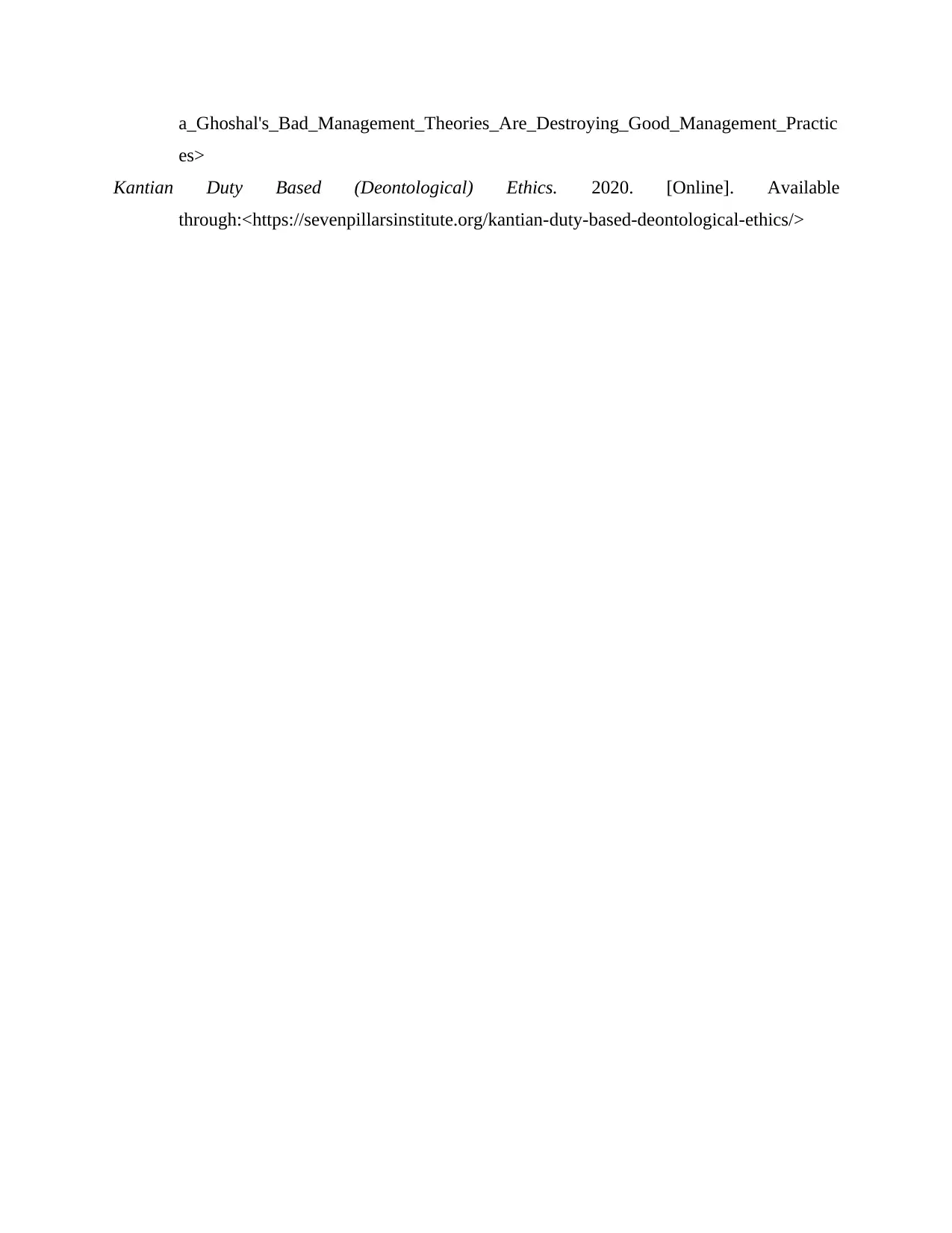
a_Ghoshal's_Bad_Management_Theories_Are_Destroying_Good_Management_Practic
es>
Kantian Duty Based (Deontological) Ethics. 2020. [Online]. Available
through:<https://sevenpillarsinstitute.org/kantian-duty-based-deontological-ethics/>
es>
Kantian Duty Based (Deontological) Ethics. 2020. [Online]. Available
through:<https://sevenpillarsinstitute.org/kantian-duty-based-deontological-ethics/>
⊘ This is a preview!⊘
Do you want full access?
Subscribe today to unlock all pages.

Trusted by 1+ million students worldwide
1 out of 12
Related Documents
Your All-in-One AI-Powered Toolkit for Academic Success.
+13062052269
info@desklib.com
Available 24*7 on WhatsApp / Email
![[object Object]](/_next/static/media/star-bottom.7253800d.svg)
Unlock your academic potential
Copyright © 2020–2026 A2Z Services. All Rights Reserved. Developed and managed by ZUCOL.





